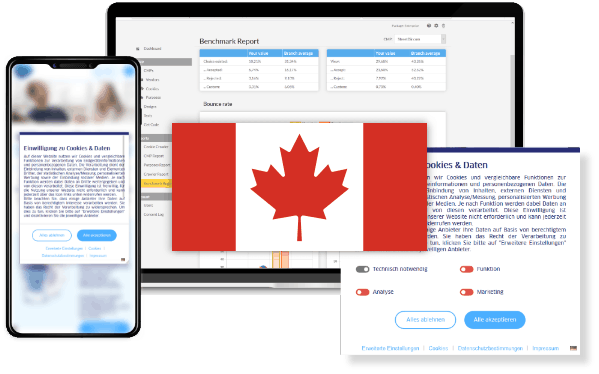In the last post we looked at what PIPEDA and CPPA actually are. Now we want to take a closer look at what a website operator has to consider in terms of cookie consent, data protection guidelines and other things.

Cookie consent in the PIPEDA
Consent to collect personal data in PIPEDA
Information about the collection, use and disclosure of personal data must be provided in a complete form. To make Cookie Consent easier to understand in the pipeda, some elements should be emphasized more.
The Personal Information Protection and Electronic Documents Act requires the consumer to quickly understand the nature and purpose of what they consent to via Cookie Consent in the PIPEDA . For consent to be considered valid and meaningful, organizations must communicate their privacy practices in a comprehensive and understandable manner. This in turn means that companies must provide information about their privacy practices in a form that is easily accessible to interested parties.
Unfortunately, the reality is often that important privacy policy information is buried in the terms of service. Anyone who can only spend a little time and energy checking the data protection information derives no practical benefit from the information overload. To obtain meaningful consent , organizations must enable a webpage visitor to quickly and directly review the key elements of privacy decisions. This is important, for example, if the use of the service or product offered requires the purchase or download of an app or other application.
Consumers and customers expect that their personal data will not be passed on to another organization without their knowledge and consent, even in the case of a cookie consent in the PIPEDA. This aspect must also be taken into account with the cookie consent in PIPEDA. For this reason, disclosure to third parties must be clearly indicated . Particular attention should be paid to disclosure to third parties who can use the information for their own purposes, as opposed to simply providing services.
For what purposes is personal data collected, used or shared? Customers and consumers must be informed of all purposes for which information is collected and used. They must be able to understand what they are being asked for their consent to do. This purpose should be described in plain language. Vague intentions and formulations such as “service optimization” should be avoided. What is essential for the provision of a service should be distinguished from data that is not. All available options should be explained clearly and openly.
damage and consequences
Risks of data misuse and data loss
When a company or organization designs potential scenarios for harm that may arise from the collection, use, or disclosure of personal information, the Personal Information Protection and Electronic Documents Act requires that it be responsible for mitigating that risk. In some cases, proactive risk mitigation efforts can significantly reduce risk. In other cases, however, the risk will remain almost unchanged.
The consumer must always be informed about significant residual risks with significant damage. A significant risk, as defined by the Personal Information Protection and Electronic Documents Act , is a risk that has more than a minimal probability. Significant harm includes physical harm, humiliation, damage to reputation, loss of employment, business or career opportunity, and financial loss.
These risks also include identity theft and negative effects on creditworthiness. The risk of damage should therefore be defined broadly. In addition to damage that is immediate, it should also include reasonably foreseeable damage that may be caused by malicious actors or others.
Provide individuals with clear ways to say “yes” or “no.”
Before using a product or service, the consumer must have a choice. This choice must be clearly explained and made easily accessible. Whether each choice is best described as “opt-in” or “opt-out” depends on the factors in place with the cookie consent in Pipeda.
Be innovative and creative
Organizations should design and/or implement innovative cookie consent processes in PIPEDA that can be implemented just-in-time, are context-specific and fit the type of interface used.
Cookie consent in the PIPEDA
An informed consent in the form of a cookie consent in PIPEDA is an ongoing process that changes with changing circumstances; Organizations should not rely on a static point in time , but treat consent as a dynamic and interactive process .
Changes in the Data Protection Regulation
If an organization plans to make material changes to its data protection practices under the GDPR for Canada, it must notify users and obtain their consent before the changes take effect. Significant changes include the use of personal data for a new purpose not originally intended or a new disclosure of personal data to third parties for a purpose other than processing necessary for the provision of a service.
Remember privacy
Businesses should consider periodically reminding individuals of their privacy choices and asking them to review them, in accordance with the GDPR for Canada. Finally, as a best practice, organizations should regularly review their information management practices to ensure that personal data continues to be handled as described to the individual.
demonstrate compliance
Organizations should, when asked, be able to demonstrate compliance and, in particular, that the consent process they implement is sufficiently understandable from the general perspective of their target audience(s) to enable valid and meaningful consent.
In order to obtain meaningful consent and meet their associated obligations under Canada’s Data Protection Act, organizations must:
- Provide privacy information in a complete form, emphasizing or drawing attention to four key elements:
- Which personal data should be collected?
- With which parties is personal data shared according to?
- For what purposes is personal data collected, used or shared?
- What are the risks for damage and other consequences?
- Form of consent – Cookie Consent in the PIPEDA
- Obtain explicit consent for any collection, use, or disclosure.
FAQ: PIPEDA
Private sector privacy laws require companies to create and publish easily accessible privacy policies. Explain how customers’ personal information is collected, used, and shared. This also means that the privacy policy must be published on the web if the company has an online presence.
The Personal Information Protection and Electronic Documents Act (PIPEDA) is the federal privacy law for private-sector organizations. It sets the ground rules for how companies must handle personal information in the course of their business operations.
The Personal Information Protection and Electronic Documents Act (PIPEDA) is the federal privacy law for commercial organizations in Canada. PIPEDA serves to align Canada’s reporting obligations with the country’s trading partners, namely the EU.
- accountability
- earmarking
- approval
- Data avoidance and data economy
- Storage, Use and Processing
- accuracy
- integrity and confidentiality
- transparency
- right of providing information
- right of appeal
The legal basis for PIPEDA came into force on January 1, 2004. The Personal Information Protection and Electronic Documents Act was enacted to address legitimate consumer privacy concerns and enable Canadian businesses to compete in the global digital economy. The political aim of the reform is to build trust in e-commerce.
Translated, PIPEDA means something like law for the protection of personal information and electronic documents.
PIPEDA is used for organizations and companies of all sizes. The GDPR for Canada regulates the collection, use and disclosure of personal data – including across borders.


